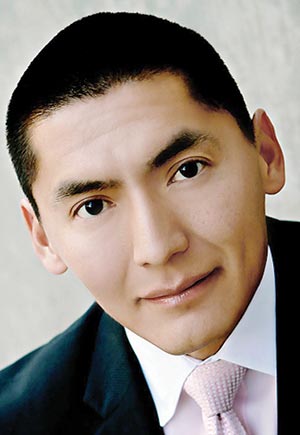Diné senator vows to build bridges
By Cindy Yurth
Tséyi' Bureau
WINDOW ROCK, Dec.26, 2013

Carlyle Begay
Carlyle Begay (D-Dist. 7) believes he can be a bridge between the two.
Begay, who turned 33 Dec. 14, was appointed Aug. 6 to fill the unexpired term of Sen. Jack C. Jackson, who resigned to accept a post with the U.S. State Department as liaison for Native American Affairs.
In a telephone interview last week, Begay said he has been studying the issues and thinking hard about the upcoming legislative session so that he can hit the ground running.
What he sees, basically, is that "the state doesn't do a good enough job of reaching out to the tribes."
Begay has already tried to remedy that by inviting some of his fellow legislators to the Tuba City Fair and showing them around the former Bennett Freeze area so that they could "see, touch and feel" the conditions many Navajos are living in.
"They were pretty amazed," he said.
But ultimately, he said, "What's in the best interest of the state is in the best interest of the tribes," and the two Arizonas are not that far apart.
"At the end of the day," said Begay, who is Totsohnii born for Kinyaa'áanii, "our futures are intertwined.
"We all want to use our limited resources effectively," he continued. "We all want to protect the environment. We all want to sustain healthy communities."
As far as legislation he intends to introduce, Begay outlined the following priorities:
- Striking the tribe's intergovernmental compact with the state for sharing its fuel excise tax. Currently, said Begay, the Navajo Nation is the only tribe in the state that has an intergovernmental compact requiring the tribe to share one-third of its 18-cents-a-gallon fuel excise tax with the state -- and Arizona is the only one of the three states the Navajo Nation spans that requires the split.
The compact results in the diversion of $3.7 million a year to the state.
"It's not an enormous amount of money," admitted Begay, "but when you consider the Navajo Nation has 18,000 miles of roads of which only 3,000 are paved, why should we be sharing any with the state? We need it here."
- Apportioning the transaction privilege tax. For years, Rep. Albert Hale and others have been introducing legislation to return some of the transaction privilege tax, or sales tax, to the tribal entities where it was collected, much as cities and counties collect their share.
Begay supports that effort, but it has been unsuccessful so far.
In the interim, he will propose creating a Rural and Tribal Infrastructure Fund that will funnel some of those dollars into a revolving fund to invest in infrastructure for poor rural areas like the former Bennett Freeze on the Navajo Nation.
"As I see it, the lack of infrastructure is the main thing holding tribes back from development," Begay said. "There is simply no way to develop without having infrastructure -- roads, power and water -- in place."
How to get The Times:

